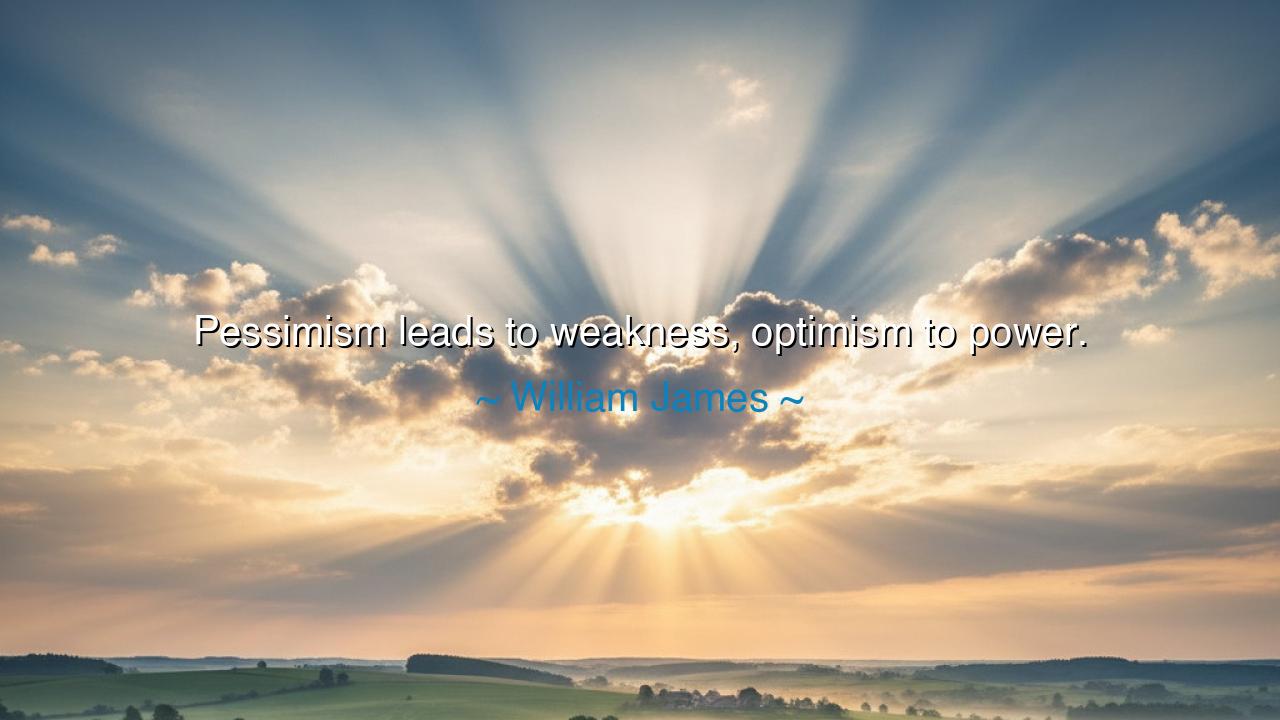
Pessimism leads to weakness, optimism to power.






Hearken, O seekers of truth, to the words of William James, sage of mind and spirit, who declared: “Pessimism leads to weakness, optimism to power.” This is not mere ornament of speech, nor idle counsel, but a law woven into the fabric of the soul. For as the body is nourished by bread and water, so is the spirit nourished by hope. When hope falters, the strength of the heart withers; when hope burns brightly, even the frailest frame can rise with the vigor of giants.
Consider well the nature of pessimism. It is a thief that enters unseen, robbing men of courage before the battle is begun. It whispers: “Why try? You will fail.” And at once, the arm grows heavy, the mind sluggish, the will unsteady. Pessimism weakens not because the task is impossible, but because the soul, poisoned by despair, surrenders before the contest. Truly, as James taught, it is the shadow that unmakes strength, the weight that drags all virtue down.
Now contrast it with the blazing fire of optimism. For optimism is no blind dream, but a force that awakens power. It declares: “Though the path is steep, I shall climb it. Though the storm is fierce, I shall endure.” In such words lies the very breath of life, and in such spirit lies the fountain of endurance. Optimism does not erase hardship; it transforms hardship into fuel. Thus the weary find new strength, the fearful find boldness, and the lost discover a way.
History bears witness to this truth. Recall the story of Winston Churchill in the dark days of World War II. All Europe trembled beneath the heel of tyranny, and Britain stood alone, its skies blackened with enemy planes. Many counseled despair, many urged surrender. Yet Churchill, with unyielding voice, spoke words of fierce optimism: “We shall fight on the beaches, we shall fight in the fields, we shall never surrender.” His optimism was not naivety—it was power. It rallied a weary people, stiffened their will, and gave them strength to resist until the tide of history turned. Had he yielded to pessimism, weakness would have destroyed them. Instead, optimism became their shield and their sword.
Mark well, children of tomorrow: your own battles may not be fought with steel and fire, yet the struggle of the spirit is no less real. In moments of trial, the poison of pessimism will whisper in your ear, urging you to retreat, to abandon your hopes, to shrink from the labor. Resist it as you would resist a mortal enemy. For if you grant it lodging in your heart, it will sap your strength and leave you broken.
Instead, cultivate the strength of optimism. Each morning, rise and speak words of courage to yourself: “I am able. I am worthy. I will endure.” When obstacles loom, let optimism be your torch. When failures strike, let optimism be the seed of renewal. Such thoughts are not idle illusions; they are weapons forged in the furnace of faith, and with them you can carve a path where none seems to exist.
Therefore, take this lesson into your life: Pessimism leads to weakness, optimism to power. Guard your mind as a fortress, allow no seed of despair to take root. Surround yourself with words, deeds, and companions that lift your spirit rather than crush it. And when doubt arises, remember Churchill, remember James, remember all who stood tall because they refused to bow to despair.
And when your days draw to a close, may it be said of you that you lived with power—not the power of riches or armies, but the greater power of a heart that never ceased to hope. For this is the true legacy of man: to shine with the light of optimism even in the darkness, and to pass that flame to those who walk after him.
––






TPThuy Phan
This quote raises questions about societal and cultural influences on mindset. Are some cultures more likely to value optimism as a source of power, while others view pessimism as wisdom or caution? How does upbringing, education, and environment shape whether someone gravitates toward optimism or pessimism, and can these tendencies be intentionally changed to improve outcomes personally and professionally?
BTnguyen tran bao tram
I’m intrigued by the moral or philosophical angle of this statement. Does the choice between optimism and pessimism influence ethical behavior, resilience, or decision-making? Can optimism empower individuals to act boldly in the face of challenges, while pessimism discourages engagement? I’d like to explore whether cultivating optimism is more about mindset, habit, or conscious effort, and what methods are most effective.
CTLe cao tung
This perspective makes me think about personal growth. Is optimism inherently linked to success, or does it need to be paired with skills and effort to create true power? Also, does persistent pessimism become a self-fulfilling prophecy, or are there ways to channel caution and skepticism productively? I’d like to hear strategies for turning a naturally pessimistic outlook into a source of insight without losing strength.
MPle minh phuong
I find this idea compelling but wonder how it applies in leadership and teamwork. Does a leader’s optimism really empower others, or could it backfire if not grounded in reality? How can teams balance positive thinking with critical evaluation to ensure that optimism drives action rather than creating overconfidence? I’m curious about practical ways to cultivate constructive optimism without ignoring potential risks.
I_iam __ctu
This quote makes me reflect on the psychological impact of mindset. Can optimism genuinely translate into tangible power, or is it more about perception and motivation? Conversely, does pessimism always weaken someone, or can it sometimes act as a protective mechanism to anticipate problems? I’d like to explore whether there are situations where pessimism might actually be strategically beneficial rather than purely limiting.